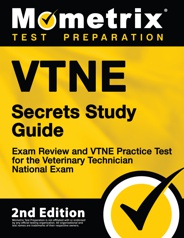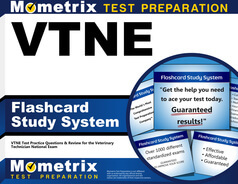The Veterinary Technician National Exam (VTNE) is administered throughout the US and Canada to credential entry-level veterinary technicians. You must earn a passing score to be classified as competent and credentialed as a vet tech.
Click the “Start Test” above to begin your free VTNE practice test! These practice questions will give you a better idea of what to study for your exam.
Eligibility
The eligibility requirements needed to take the VTNE will be different depending on your jurisdiction.
In most cases, the American Association of Veterinary State Boards (AAVSB) will determine your eligibility by reviewing a final transcript sent directly by the school, which must show that you are an AVMA- or CVMA-accredited veterinary technology graduate. In some jurisdictions, you must meet certain work experience requirements, while others require you to submit a state/provincial application separately from the VTNE application.
Check with your jurisdiction to ensure you know their specific requirements.
VTNE Exam Outline
The VTNE contains 170 multiple-choice questions, 20 of which are “pilot questions” that do not count toward your score, and you will be given 3 hours to complete them. The pilot questions are used to evaluate questions for future versions of the exam.
The questions are split into 10 domains, each containing a number of “tasks.”
1. Pharmacy and Pharmacology (20 questions)
The questions in this domain are designed to assess your knowledge and abilities in the following areas:
- Physiology, anatomy, and pathophysiology as they pertain to pharmacological and biological agents
- Drug classifications, drug mechanisms, and relevant side effects
- Ensure patient/client safety by educating the client regarding any administered or dispensed biological and pharmacological agents
- Prepare and dispense medications in compliance with veterinary orders
- Calculate fluid therapy rate
- Calculate medications based on the appropriate dosage
- Maintain controlled drug inventory
- Handle, store, and safely dispose of biological and pharmacological agents
2. Surgical Nursing (20 questions)
The questions in this domain are designed to assess your knowledge and abilities in the following areas:
- Physiology, anatomy, and pathophysiology as they pertain to surgical nursing
- Operate as both a sterile and non-sterile surgical technician
- Use appropriate instrument-cleaning methods
- Use appropriate equipment-sterilization methods
- Maintain aseptic conditions during surgical procedures, as well as in the surgical suite
- Prepare the patient for a surgical procedure
- Prepare the surgical environment, instruments, and supplies
3. Dentistry (10 questions)
The questions in this domain are designed to assess your knowledge and abilities in the following areas:
- Apply knowledge of physiology, anatomy, and pathophysiology as they pertain to dentistry
- Educate the client on dental health
- Prepare and maintain the environment, instruments, and supplies for dental procedures
- Perform oral examination
- Produce diagnostic dental images
4. Laboratory Procedures (14 questions)
The questions in this domain are designed to assess your knowledge and abilities in the following areas:
- Apply knowledge of physiology, anatomy, and pathophysiology as they pertain to laboratory procedures
- Prepare and maintain specimens for in-house or outside evaluation
- Perform laboratory tests and procedures
- Maintain lab equipment and supplies
5. Animal Care and Nursing (30 questions)
The questions in this domain are designed to assess your knowledge and abilities in the following areas:
- Apply knowledge of physiology, anatomy, and pathophysiology as they pertain to patient care and nursing
- Document evaluations of procedures and mentation status of patients
- Educate the client about animal care
- Perform nursing and clinical diagnostic procedures
- Provide a safe and sanitary environment for patients
- Maintain diagnostic equipment
- Use appropriate routes to administer medications
- Collect specimens and patient information
- Adhere to the appropriate disposal protocols of hazardous materials
- Maintain therapeutic treatments
- Manage hospitalized patients
- Perform physical rehabilitation
- Provide assistance with euthanasia
- Recognize patients’ behavioral characteristics
- Safely restrain small and large animals using the applicable devices and equipment
6. Diagnostic Imaging (9 questions)
The questions in this domain are designed to assess your knowledge and abilities in the following areas:
- Apply knowledge of physiology, anatomy, and pathophysiology as they pertain to diagnostic images
- Produce diagnostic images
- Maintain imaging/radiograph equipment and related materials
7. Anesthesia (20 questions)
The questions in this domain are designed to assess your knowledge and abilities in the following areas:
- Apply knowledge of physiology, anatomy, and pathophysiology as they pertain to anesthesia
- Help develop and implement an anesthetic plan
- Prepare anesthetic equipment and related materials
- Educate the client about anesthesia
- Maintain anesthetic equipment
- Use endotracheal intubation to maintain a patent airway
- Monitor patients
- Obtain patient-related information
- Respond appropriately to changes in the patient’s status
8. Emergency Medicine/Critical Care (10 questions)
The questions in this domain are designed to assess your knowledge and abilities in the following areas:
- Apply knowledge of physiology, anatomy, and pathophysiology as they pertain to medicine and critical care
- Perform triage of a patient who is in critical condition
- Perform emergency and critical care nursing procedures
- Perform ongoing evaluation of patients
9. Pain Management/Analgesia (10 questions)
The questions in this domain are designed to assess your knowledge and abilities in the following areas:
- Apply knowledge of physiology, anatomy, and pathophysiology as they pertain to pain management and analgesia
- Diagnose the need for analgesia in a patient
- Educate the client about pain assessment and management
- Assist in developing and implementing the pain management plan
10. Communication and Veterinary Professional Support Services (7 questions)
The questions in this domain are designed to assess your knowledge and abilities in the following areas:
- Educate the client about animal care, risks, and side effects
- Maintain professional communication in all client and vet interactions
- Collect patient information
- Provide assistance with the euthanasia process
Check Out Mometrix's VTNE Study Guide
Get practice questions, video tutorials, and detailed study lessons
Get Your Study Guide
Registration
Once your eligibility has been verified, you can submit your application online at the AASVB website. You will need to send the $365 exam fee along with your application.
After your application has been approved, you will then be able to schedule your exam date. When scheduling your exam, you will have the opportunity to choose between in-person testing or Live Remote Proctored (LRP) testing.
There are three windows in which you can schedule your VTNE examination each year:
- March 15 to April 15
- July 15 to August 15
- November 15 to December 15
Test Day
The day of your exam will look different depending on which testing method you chose during registration.
In-person Testing
You should arrive at the testing center 15-30 minutes before the scheduled exam time. Once you arrive, you will be asked to provide a valid photo ID. Failure to provide valid identification will result in your exam session being terminated immediately.
Before you enter the testing room, you will be asked to leave all personal items in a secure locker. This includes your cell phone, bag, jewelry, coat, notes, pencils, paper, and food.
When you enter the testing room, you will be given a dry-erase board, marker, and eraser to use for math problems and other analytical problems. You will also have access to an online calculator.
Though breaks are generally allowed, the timer does not stop once the exam begins, so use your breaks wisely.
Live Remote Proctoring
Before test day arrives, you should perform a system check provided by PSI to ensure that you have the necessary technological requirements. These are the items needed to test remotely:
- A PC or Mac
- Windows 7 or higher, or MAC 10 or higher
- The most updated version of Google Chrome (no other browsers are supported)
- Web cam
- Microphone
- Speakers
- Reliable internet connection
You are not allowed to have any personal items on your desk/table, but you are allowed to have a miniature whiteboard, dry-erase markers, and an eraser. You must also ensure that no one enters the room during the testing period.
You should log in to your account 15-30 minutes prior to your scheduled exam time. Once you log in, you will be asked to show a valid photo ID and scan your room using your webcam (you are allowed to lift your laptop if you have no external webcam).
Once the proctor has determined you are ready, the exam will begin.
How the Test is Scored
The passing score for the VTNE varies from state to state. In some states, the VTNE is scored on a range from 200 to 800, with the passing score being set at 425. For other states, the VTNE is scored on a range of 0 to 100 with a passing score set at 90.
You will receive an official printed score report immediately after finishing the exam. Score reports will also be posted on your MyAAVSB portal approximately 2-3 weeks after the exam window ends, in addition to being available to the respective provincial or state agency.
You can transfer your score to a jurisdiction other than the one indicated on your application by submitting a request to VIVA Program. An $85 Veterinarian Online Score Transfer fee will apply.
VTNE Online Prep Course
If you want to be fully prepared, Mometrix offers an online VTNE prep course designed to give you everything you need to succeed!
Here’s what you’ll find in the VTNE course:
- 80+ Review Lessons Covering Every Topic
- Over 500 VTNE Practice Questions
- 200+ Video Tutorials
- 850+ Digital Flashcards
- Money-back Guarantee
- Mobile Access
Everyone learns differently, so we’ve tailored the VTNE online prep course to ensure every learner has what they need to prepare for the VTNE exam.
Click below to check it out!
Check Out Mometrix's VTNE Flashcards
Get complex subjects broken down into easily understandable concepts
Get Your Flashcards
Study Tips
How to Study Effectively
Your success on VTNE test day depends not only on how many hours you put into preparing but also on whether you prepared the right way. It’s good to check along the way to see whether your studying is paying off. One of the most effective ways to do this is by taking VTNE practice tests to evaluate your progress. Practice tests are useful because they show exactly where you need to improve. Every time you take a free VTNE exam practice test, pay special attention to these three groups of questions:
- The questions you got wrong
- The ones you had to guess on, even if you guessed right
- The ones you found difficult or slow to work through
This will show you exactly what your weak areas are and where you need to devote more study time. Ask yourself why each of these questions gave you trouble. Was it because you didn’t understand the material? Was it because you didn’t remember the vocabulary? Do you need more repetitions on this type of question to build speed and confidence? Dig into those questions and figure out how you can strengthen your weak areas as you go back to review the material.
Answer Explanations
Additionally, many VTNE practice tests have a section explaining the answer choices. It can be tempting to read the explanation and think that you now have a good understanding of the concept. However, an explanation likely only covers part of the question’s broader context. Even if the explanation makes sense, go back and investigate every concept related to the question until you’re positive you have a thorough understanding.
Comprehend Each Topic
As you go along, keep in mind that the VTNE practice test is just that: practice. Memorizing these questions and answers will not be very helpful on the actual test because it is unlikely to have any of the same exact questions. If you only know the right answers to the sample questions, you won’t be prepared for the real thing. Study the concepts until you understand them fully, and then you’ll be able to answer any question that shows up on the test.
Strategy for VTNE Practice
When you’re ready to start taking practice tests, follow this strategy:
- Remove Limitations. Take the first test with no time constraints and with your notes and VTNE study guide handy. Take your time and focus on applying the strategies you’ve learned.
- Time Yourself. Take the second practice test “open book” as well, but set a timer and practice pacing yourself to finish in time.
- Simulate Test Day. Take any other practice tests as if it were test day. Set a timer and put away your study materials. Sit at a table or desk in a quiet room, imagine yourself at the testing center, and answer questions as quickly and accurately as possible.
- Keep Practicing. Keep taking practice tests on a regular basis until you run out of practice tests or it’s time for the actual test. Your mind will be ready for the schedule and stress of test day, and you’ll be able to focus on recalling the material you’ve learned.
FAQs
Q
How many questions are on the VTNE exam?
A
There are 170 multiple-choice questions on the exam.
Q
How long is the VTNE exam?
A
The time limit for this exam is 3 hours.
Q
What is the passing score for the VTNE exam?
A
There is no set passing score for the exam; it depends on your jurisdiction.
Q
How much does the VTNE exam cost?
A
The examination fee is $365.



